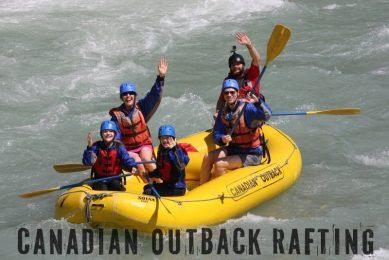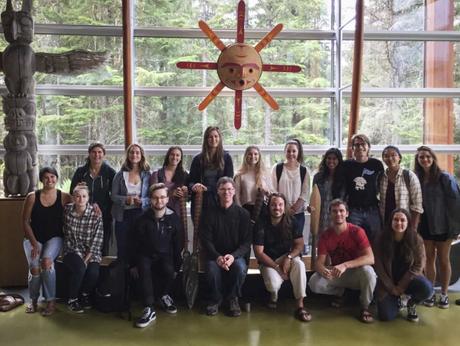In June of 2015, my wife, two daughters, and I traveled to Vancouver, British Columbia, where I attended a 3-day international teaching conference. Remarkably, the most pivotal professional development event of this trip wasn’t the conference, however; it was a half-day whitewater rafting excursion that led me to reconceptualize much of my work with students.
On the day of our rafting adventure, we rented a car and drove about an hour north via the Sea-to-Sky Highway to the mountain community of Squamish. We registered with the outfitter and then met Shane – our witty, bearded, abundantly enthusiastic, twenty-

Shane answered my question by detailing his educational experience at nearby Quest University-Canada. He shared how Quest opened in 2002 with a vision for being a university for the new millennium, ultimately earning a reputation for being “the most experimental university in North America.” Instead of completing a major, for example, after his first two years exploring different questions, Shane was required to identify a formal, individualized Question that would shape his final two years of study. His question – “how can I inspire an eco-centric perspective?” – was carefully crafted to reflect his interests, and his faculty mentor guided him to courses, learning opportunities, and experiential activities most relevant to his exploration. This, he said, not only enabled him to develop the knowledge and passion to lead tours like we experienced, but also showed how his work life was intricately tied to his education.
I was beyond intrigued. Upon returning to the United States, I sought more information. I learned that, at Quest, faculty are called “Tutors” instead of “Professors” because their focus is explicitly connected to student learning, not to “professing.” Another relatively unique element of the Quest model is to offer courses in a Block System, meaning that students and faculty concentrate on one course at a time, each offered for roughly one month. I continued to follow my intrigue and, one thing leading to the next, I eventually was offered a Visiting Tutor position during one of the Summer Blocks of 2018.
In preparation for my teaching assignment, I read a variety of additional materials shared by the Coordinator who hired me, including university policies, sample syllabi, and tips for teaching in this innovative environment. I learned how each classroom at Quest is the same: one oval table with 21 chairs (20 for students, 1 for the Tutor), plenty of white board space, and no permanent technology. Each course is expected to have at least one field trip. The teaching philosophy Quest promotes is essentially that of a “flipped classroom,” where students learn from readings and audiovisual materials outside of class so that, during class, the majority of time can be devoted to discussion and other experiential activities. Powerpoint presentations and lectures are strongly discouraged. Feedback on the course is collected not only through student evaluations but by a student-appointed “Block Representative” (near the beginning of the term) and the relevant faculty Coordinator (near the end of the term) who “interview” the class for 30 minutes and then share their constructive impressions afterward.
Teaching at Quest was a revelation. Students not only would read assigned articles; they would regularly seek additional resources for further learning. Students not only would complete assignments; they often would be prepared to articulate a comment or question during class that attempted to break new ground. Students didn’t accept a passive role as learners; they challenged me to defend instructional choices and pushed me to higher content mastery and pedagogical creativity. All of this made it easy for me to understand why Quest students consistently outperform students from colleges and universities across Canada in almost every category of the National Survey of Student Engagement.

Class field trip, Squamish Lil’wat Cultural Centre, Whistler, British Columbia
But the story doesn’t end there. I don’t have a faculty position at Quest. I am a proud member of the faculty at Normandale Community College in Bloomington, Minnesota. Normandale is a very different institution than Quest. We are essentially open-access. This results in a student body that is generally less academically prepared for college, more burdened with various stressful personal circumstances, and frequently less intrinsically motivated to learn.
When I returned home that summer from Quest, I joined a group of dedicated faculty at Normandale for a discussion of Parker Palmer’s classic book “The Courage to Teach.” Probably inspired by its’ central theme of “exploring the inner landscape of a teacher’s life” – but still with my experience at Quest in mind – my own version of an individualized Question emerged: can I trust my students? As I reflected on my experience with students at Quest, it appeared to me that I did, in fact, trust them in profound and unique ways. Part of this was because of the sheer competence they showed in the classroom, but at least some of my trust was due my preconceptions of them due to their institutional affiliation. To what extent can I trust my Normandale students in the same ways I trusted my Quest students?
For instance, can I trust my community college students to similarly do their work outside of class and expect they will not only complete what is asked but also come to class prepared for higher-level engagement? Before Quest, I believed I could not, and this brought serious limitations. In some ways, I felt forced to do more work for my students, summarizing and lecturing on what was assigned to them because I didn’t believe they could learn on their own, thereby eliminating time for discussion and other experiential activities. Although I realize there are many students and situations that require additional support from my institution and me, reflecting on my experience at Quest has left me with a new sense that trust in my students is a choice I make, a stance I adopt with potentially significant ramifications. Trust communicates expectations. Trust conveys confidence. In the past year and a half, I am finding that, when I lead my courses in ways that communicate my belief in students’ capacities to do what it takes to learn, they more often rise to the challenge.
I am left to wonder: how often does the transformation of a student into a self-sufficient, lifelong learner not begin with someone’s trust?
